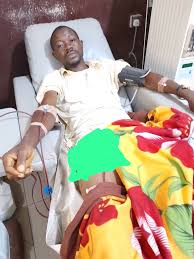The Minister of State for Health and Social Welfare, Dr. Iziaq Adekunle Salako has urged public health institutions to digitize their clinical services and operations in order to ensure qualitative healthcare for all Nigerians.
Salako who spoke in Lagos during his oversight visit to the Federal Medical Centre Ebute Metta; Federal Neuro-Psychiatric Hospital, Yaba, and National Orthopaedic Hospital, Igbobi all in Lagos, commended the management and staff of the FMC Ebute Metta for their exemplary operations.
He described the facility as a “small body with a big engine,” praising its efficient use of space, digital innovations, and quality equipment.
“The paperless system here is remarkable and positions FMC Ebute Metta as a key player in Mr. President’s agenda to reverse medical tourism,” the minister said.
He outlined the federal government’s commitment to expanding cancer care, initiatives such as the Cancer Health Fund, which supports patients diagnosed with cancer, and the Catastrophic Health Fund, which subsidizes treatments for severe conditions, including kidney dialysis.
Subsidised dialysis cost
“Dialysis costs have been reduced from N50,000 per session to N12,000 due to government interventions. Expanding cancer treatment facilities and raising awareness are also high priorities.”
He said the federal government is addressing the issue of bed space through the establishment of eight new Federal Medical Centres and teaching hospitals across the country.
“These expansions will alleviate pressure on existing facilities and provide more bed spaces for patients,” he explained.
He added that increased budget allocations to the health sector would further support infrastructure development.
Yaba psychiatric hospital
At the Yaba Psychiatric Hospital, the minister acknowledged that not much commitment has been shown on improving mental health care in the country.
He assured the hospital of support through the implementation of the newly signed Mental Health Bill, which aims to expand the mental health care space and establish a mental health department within the Federal Ministry of Health.
“With the signing of the Mental Health Bill into law, we are prepared to take bold steps to prioritise mental health in Nigeria.
“This includes addressing drug abuse, supporting indigent patients, and enhancing infrastructure and technology at psychiatric institutions like this one.
“The government is exploring a Vulnerable Support Fund in the 2024-2025 budget to assist indigent patients. We also aim to address delays in manpower approvals and encourage healthcare workers to remain committed to serving their country,” he revealed.”
National Orthopedic Hospital, Igbobi
Salako commended the hospital’s role in reducing medical tourism by providing specialised surgeries such as spinal and hip replacement procedures, saving foreign exchange for Nigeria.
He also pledged the federal government’s support to address the institution’s challenges, emphasising the government’s commitment to advancing healthcare infrastructure and ensuring patient satisfaction.
“The National Orthopedic Hospital, Lagos, is a centre of excellence, and we must continue to expand services, improve skills, and build confidence in what we do. We will explore avenues to address energy issues, rehabilitate aging infrastructure, and support the training institutions,” Salako stated.
The Medical Director, FMC Ebute Metta, Dr Adedamola Dada, explained how he was able to reposition the hospital which initially had 72 bed spaces to 450 beds currently.
He credited the transformation to a well-executed roadmap, which enabled the hospital to maximize its resources and serve more patients.
“The hospital’s infrastructure and capacity have also expanded significantly. Operating theatres increased from three to 12. Training programmes expanded from two departments to eight and annual patient load quadrupled from 50,000–60,000 to over 200,000, with approximately 4,000 new patients registered each month.”
He said under his leadership, FMC Ebute Metta became the first public health institution in Nigeria to attain Level 4 certification under the international SafeCare Assessment Programme.
Also, the Medical Director of the National Orthopedic Hospital (NOHIL), who was represented by the Head of Clinical Services, Dr. Lawal Wakeel Olaide disclosed that the hospital has adopted full automated clinical services and operations.
“We operate a wallet system, ensuring seamless financial management for patient care. This automation supports our goal of enhancing efficiency and transparency,” he said.
Despite these achievements, Olaide highlighted pressing challenges, including aging infrastructure, inadequate energy supply, and limited capacity for patient care and student training. “We are an institution of over 80 years old. Most of our facilities, including our gym, are in dire need of rehabilitation. Energy costs alone amount to ?50-60 million monthly, and our reliance on alternative sources like solar power remains insufficient for high-energy equipment.”
Also speaking, the Medical Director, the Federal Neuropsychiatric Hospital Lagos, Dr Olugbenga Owoeye called for enhanced funding and support to address persistent challenges and meet growing demands.
Expressing the hospital’s gratitude for the federal government’s commitment to mental health, he highlighted the urgent need for additional resources to sustain and expand the hospital’s services.
Owoeye highlighted the pressing need for a purpose-built drug unit, enhanced capacity for patient admissions, additional staff accommodations, and improved power supply infrastructure.
“In a month, the hospital spends over half a million on electricity alone, yet our overhead allocation is insufficient to cover this cost,” he explained.



